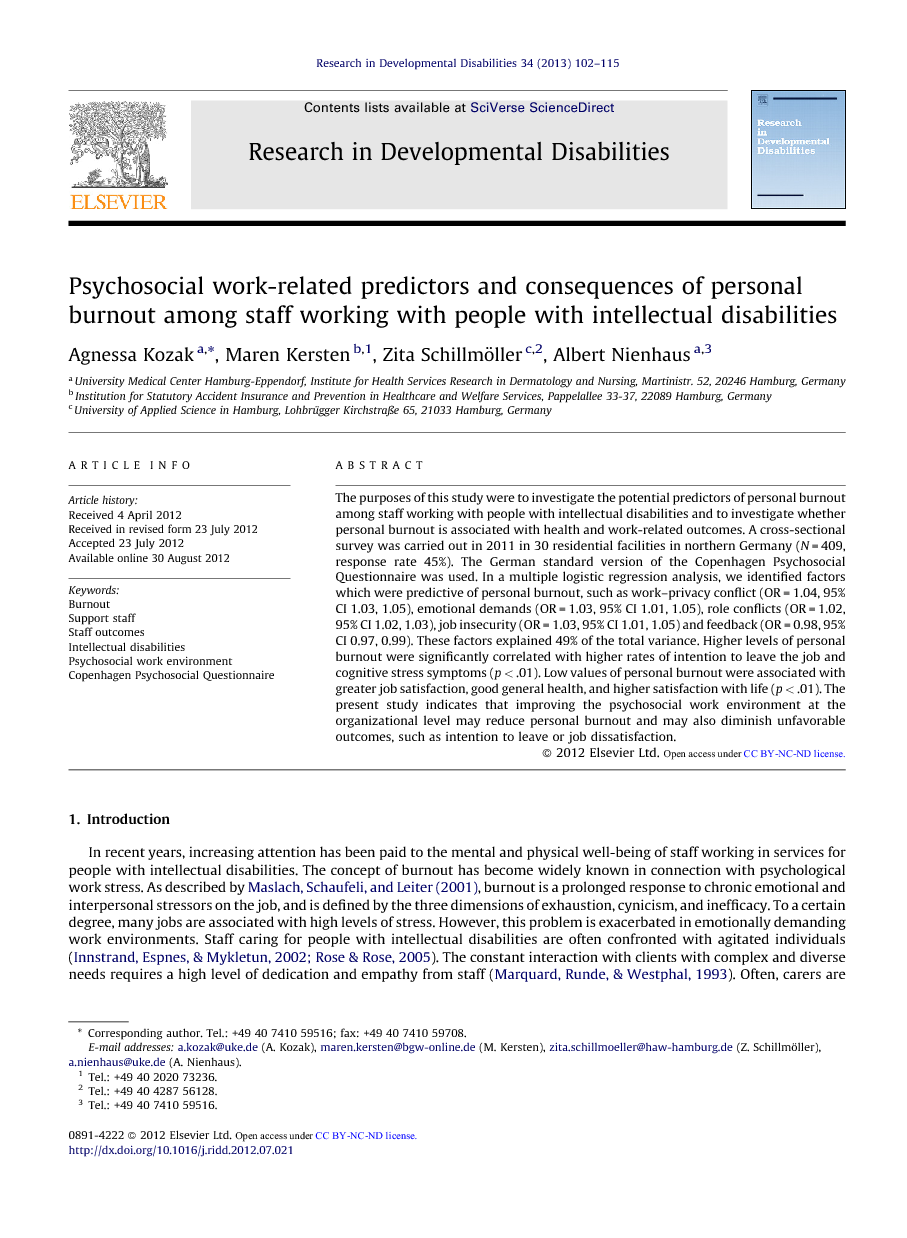The purposes of this study were to investigate the potential predictors of personal burnout among staff working with people with intellectual disabilities and to investigate whether personal burnout is associated with health and work-related outcomes. A cross-sectional survey was carried out in 2011 in 30 residential facilities in northern Germany (N = 409, response rate 45%). The German standard version of the Copenhagen Psychosocial Questionnaire was used. In a multiple logistic regression analysis, we identified factors which were predictive of personal burnout, such as work–privacy conflict (OR = 1.04, 95% CI 1.03, 1.05), emotional demands (OR = 1.03, 95% CI 1.01, 1.05), role conflicts (OR = 1.02, 95% CI 1.02, 1.03), job insecurity (OR = 1.03, 95% CI 1.01, 1.05) and feedback (OR = 0.98, 95% CI 0.97, 0.99). These factors explained 49% of the total variance. Higher levels of personal burnout were significantly correlated with higher rates of intention to leave the job and cognitive stress symptoms (p < .01). Low values of personal burnout were associated with greater job satisfaction, good general health, and higher satisfaction with life (p < .01). The present study indicates that improving the psychosocial work environment at the organizational level may reduce personal burnout and may also diminish unfavorable outcomes, such as intention to leave or job dissatisfaction.
In recent years, increasing attention has been paid to the mental and physical well-being of staff working in services for people with intellectual disabilities. The concept of burnout has become widely known in connection with psychological work stress. As described by Maslach, Schaufeli, and Leiter (2001), burnout is a prolonged response to chronic emotional and interpersonal stressors on the job, and is defined by the three dimensions of exhaustion, cynicism, and inefficacy. To a certain degree, many jobs are associated with high levels of stress. However, this problem is exacerbated in emotionally demanding work environments. Staff caring for people with intellectual disabilities are often confronted with agitated individuals (Innstrand et al., 2002 and Rose and Rose, 2005). The constant interaction with clients with complex and diverse needs requires a high level of dedication and empathy from staff (Marquard, Runde, & Westphal, 1993). Often, carers are overwhelmed by the emotional or organizational impact of the task and become exhausted. If perceived demands exceed individual coping strategies and organizational resources, stress cannot be managed appropriately (Lazarus & Folkman, 1984). Long-term exposure to stress is also associated with absenteeism, sickness, higher turnover, lower job satisfaction, reduced commitment and increased intention to leave the job (Hasselhorn et al., 2003a, Hatton and Emerson, 1998, Hatton et al., 1999b and Robertson et al., 2005). Thus, the negative consequences of stress pose a serious burden, not only for professional carers, but also for the quality of client care (Robertson et al., 2005 and Rose and Rose, 2005). Overall, burnout may lead to lower productivity and effectiveness at work (Maslach et al., 2001). Felce and Emerson (2001) point out that staff behavior, orientation and performance are important influences on the behavioral development of people with mental retardation. Staff behavior – in the form of assistance and positive contact – had a direct impact on the quality of life of the service users. Sharrard (1992) emphasizes that direct care staff are often the most important people in the lives of the clients. Thus, the assessment of stressful tasks should be of considerable concern to service providers. Research findings within the field of intellectual disability indicate that there are various psychosocial stressors and resources at work which are related to burnout and/or personal distress.


